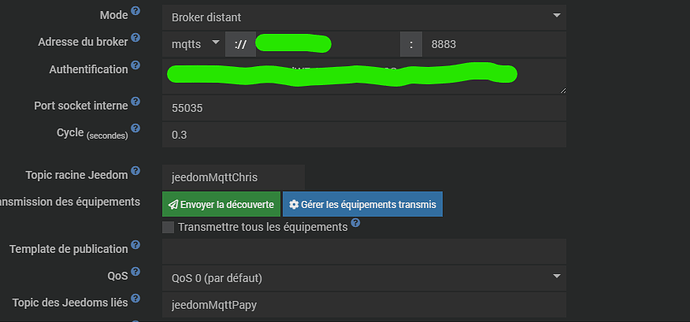Bonjour,
pour remplacer jeelink qui permettait de gérer l’interaction entre le jeedom de mon pere et le mien j’ai mis en place le mécanisme via le plugin mqtt2.
Pour ce faire j’ai exposé un broker à l’extérieur avec le protocol mqtts mais j’ai l’impression que le plugin ne gère pas la partie certificat pour les brokers distants.
Dans le code du plugin
if (config::byKey('mode', __CLASS__) == 'local' || config::byKey('mode', __CLASS__) == 'docker' ) {
$cmd .= ' --mqtt_server mqtts://127.0.0.1:8883';
$cmd .= ' --client_key ' . $path_ssl . '/client.key';
$cmd .= ' --client_crt ' . $path_ssl . '/client.crt';
$cmd .= ' --ca ' . $path_ssl . '/ca.crt';
} else {
$cmd .= ' --mqtt_server ' . config::byKey('remote::protocol', __CLASS__) . '://' . config::byKey('remote::ip', __CLASS__) . ':' . config::byKey('remote::port', __CLASS__);
}
Le passage des certificats au daemon (qui fait la connexion mqtt) est faite uniquement pour un broker local ou docker mais pas distant
Du coup j’ai modifé en ce sens
if (config::byKey('mode', __CLASS__) == 'local' || config::byKey('mode', __CLASS__) == 'docker' ) {
$cmd .= ' --mqtt_server mqtts://127.0.0.1:8883';
$cmd .= ' --client_key ' . $path_ssl . '/client.key';
$cmd .= ' --client_crt ' . $path_ssl . '/client.crt';
$cmd .= ' --ca ' . $path_ssl . '/ca.crt';
} else {
if (config::byKey('remote::protocol', __CLASS__) == 'mqtts') {
$cmd .= ' --mqtt_server ' . config::byKey('remote::protocol', __CLASS__) . '://' . config::byKey('remote::ip', __CLASS__) . ':8883';
$path_ssl = realpath(__DIR__ . '/../../data/ssl');
$cmd .= ' --client_key ' . $path_ssl . '/client.key';
$cmd .= ' --client_crt ' . $path_ssl . '/client.crt';
$cmd .= ' --ca ' . $path_ssl . '/ca.crt';
} else {
$cmd .= ' --mqtt_server ' . config::byKey('remote::protocol', __CLASS__) . '://' . config::byKey('remote::ip', __CLASS__) . ':' . config::byKey('remote::port', __CLASS__);
}
}
Et j’ai positionné les certificats dans le répertoire attendu, à savoir /data/ssl
A mon sens le plugin ne gère pas ce cas et ma modif est nécessaire ou alors j’ai loupé un truc … non ?
@+
@chris94440
